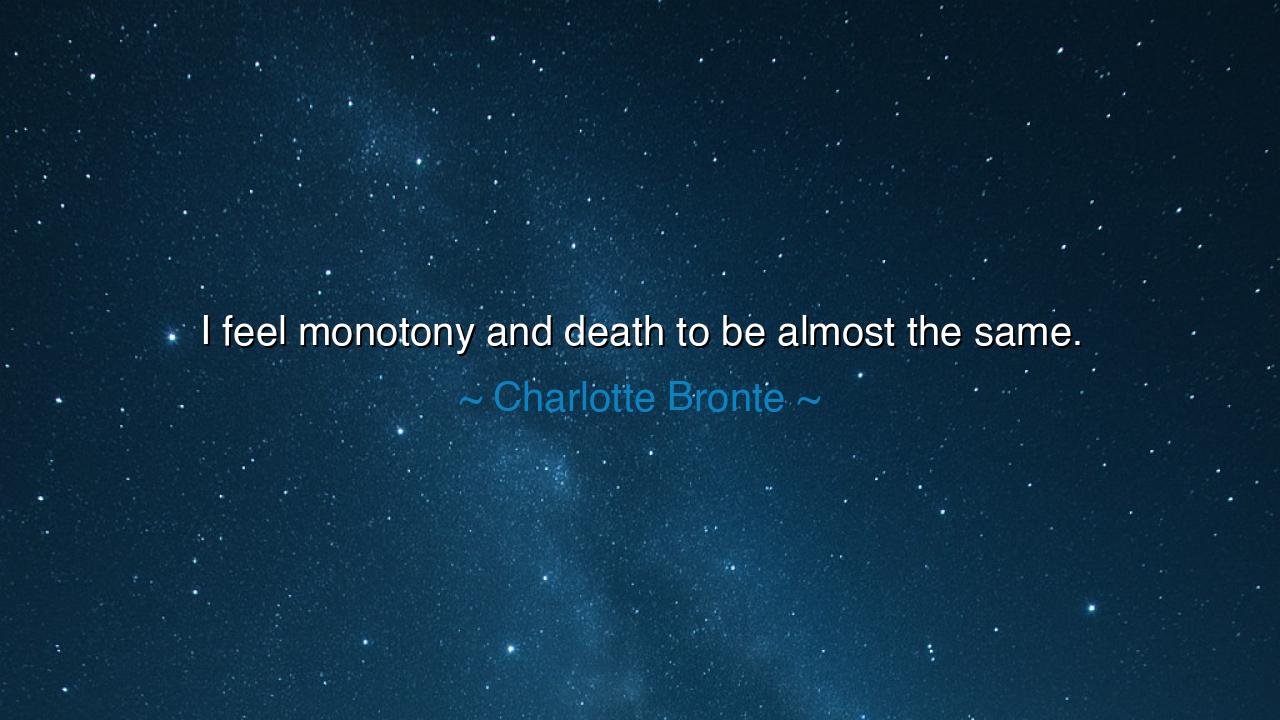
I feel monotony and death to be almost the same.






In the haunting words of Charlotte Brontë, the brilliant and tempestuous soul behind Jane Eyre, there stirs a cry from the heart of every restless spirit: “I feel monotony and death to be almost the same.” These are not the idle musings of a writer seeking poetic effect, but the confession of one who understood the full cost of living without passion, without change, without growth. For Brontë, monotony—that slow, colorless repetition of days without purpose or hope—was a kind of spiritual death, a suffocation of the soul even as the body yet breathes. She saw that the human spirit, made for creation, struggle, and renewal, cannot survive long in stillness. Life without movement, without meaning, becomes not peace, but paralysis.
The origin of this quote can be traced to Brontë’s own experience of isolation and constraint. In her youth, she worked as a governess—one of the few respectable employments available to women of her time. The endless routines, the narrowness of her world, and the suppression of her fiery imagination pressed upon her like a tomb. It was in these years that she learned to equate monotony with death, for the life she lived then was orderly but joyless, filled with duty but devoid of fulfillment. And yet from that stillness, she forged her rebellion—her pen becoming the sword that cut through her confinement. In her writing, she sought not comfort but freedom, and through her characters, she breathed again.
The ancients, too, knew this truth. The philosophers of Greece taught that stagnation is the enemy of life itself. Heraclitus, the sage of the ever-living fire, proclaimed, “All things flow.” He taught that the world is in constant motion, that vitality is born of change. To resist that flow, to cling to sameness, is to deny the very nature of existence. Thus, when Charlotte Brontë equated monotony with death, she spoke the same eternal wisdom: that life’s essence lies in becoming, in striving, in the ceaseless transformation of the soul. The river that stops flowing becomes a stagnant pool; the mind that ceases to question becomes a grave.
Consider the tale of Siddhartha Gautama, who would become the Buddha. Born into luxury, he lived in a palace where every day was the same—safe, predictable, and controlled. Yet in the midst of all that comfort, he felt a deep emptiness. It was only when he left the walls of his palace and faced the realities of suffering, aging, and death that his spirit awakened. The monotony of pleasure had been a veil over his deeper humanity. By embracing change, by confronting the pain and uncertainty of life, he found enlightenment. Thus, even across cultures and ages, we see the same truth unfold: monotony deadens; transformation redeems.
Charlotte Brontë’s words, then, are not a lament alone—they are a challenge. They call us to live deliberately, to resist the slow death that comes from the repetition of unlived days. How many rise each morning only to walk the same paths, think the same thoughts, dream the same small dreams? How many souls lie dormant, entombed within routine? The monotony that Brontë feared still haunts us today, cloaked in comfort and convenience. Yet beneath that quiet surface, the heart hungers for struggle, for wonder, for renewal. We are not meant merely to exist; we are meant to become.
And yet, Brontë does not despise order itself—only lifelessness. There is a rhythm to life, but it must be a living rhythm, not the dull ticking of a clock. To endure without evolving is to decay in spirit. Therefore, each day must bring something new: a question, an act of courage, a kindness, a creation. To live as Brontë teaches is to meet the ordinary with intensity—to turn repetition into ritual, labor into art, and silence into reflection. Life’s monotony becomes bearable only when infused with purpose. Without it, even beauty fades; with it, even hardship sings.
So, my child of tomorrow, take this lesson to heart: never let monotony become your master. Seek challenge, seek learning, seek change. When the days begin to blend together, shake yourself awake—walk a new path, speak a new truth, begin a new work. Life’s flame is sustained by movement, by curiosity, by love. To fear change is to fear life itself. Better, then, to walk into the storm of uncertainty than to wither in the stillness of a safe, predictable existence.
For as Charlotte Brontë reminds us, death does not come only at life’s end—it begins the moment we stop truly living. And so long as the heart dares to seek, to strive, to feel wonder once more, the soul remains alive. Choose, then, not monotony but motion—for in motion there is life, and in life, the eternal spark of the divine.






AAdministratorAdministrator
Welcome, honored guests. Please leave a comment, we will respond soon